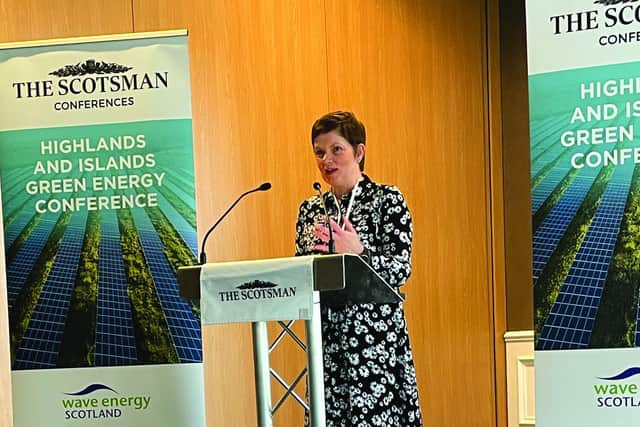Conference report: Power of collaborative conversation
Wave Energy Scotland (WES) was very pleased to be headline sponsor of the Highlands and Islands Green Energy Conference in Inverness.
The event was an excellent opportunity for key players in green energy in the North of Scotland to meet in person and share recent successes and excitement about the future opportunities.
It saw around 80 attendees from a wide range of key organisations, such as SSE, Falck Renewables, the University of the Highlands and Islands, Energy Savings Trust, and many more.


It is not common for a such a broad field of interests related to the Scottish Government’s net-zero agenda to gather together.
But, since a theme coming forward from the conference was collaboration and breaking down information silos, this was highly appropriate.
Stuart Black, chief executive of Highlands and Islands Enterprise (HIE), delivered a whirlwind review of the wealth of renewable energy related opportunities that the region offers.
The area really is comparatively rich in the natural resources that support renewable energy development, and when combined with the business innovation and skilled workforce there, the key role the region has in delivering Scotland’s net-zero targets by 2045 is obvious.
Michael Matheson MSP, cabinet secretary for netzero, energy and transport, issued a virtual address, underlining the Scottish Government’s commitment and support to its net-zero targets being met.
Councillor Raymond Bremner, leader of the Highland Council, urged everyone to be positive about what had already been achieved and the exciting opportunities ahead.
The conference panel sessions covered three main topics. Firstly, Morven Fancey of HIE chaired a session on developing and retaining skilled roles in the region. Panel members provided excellent examples of where business and academia are working together to ensure the right training is being delivered to facilitate new entrants to the sector, as well as upskilling those already involved.
The session on innovation and transitioning towards renewable energy was chaired by Audrey MacIver, director of energy and low carbon at HIE.
Showing two wave energy converters assessed at the European Marine Energy Centre test site at Scapa Flow in Orkney, Peter Dennis of WES spoke about how the structured innovation processes by his organisation have helped bring wave energy devices from the drawing board to sea trials.
The panel discussion that followed reflected on strategic locations for renewable energy deployment, the importance of demonstrating technology, and some of the barriers that could be challenged with innovative approaches.
In the final session on infrastructure and supporting business networks, the panel gave examples of good practice in areas such as community renewables, encouragement for business to think about a circular economy approach to their goods and services and the Highland Council’s Hydro-Ness renewable energy project in Inverness.
Some of the issues raised in discussions touched on the progress of wave energy technology, consideration of the opportunities for sustainable tourism, and challenges, such as housing and transport, in the region.
Ultimately, though, the broad range of conference participants will have left with encouragement that the Highlands and Islands has a key role in helping Scotland achieving its net-zero targets.
And they had the opportunity to build connections across business, academia and the public sector to help make that happen.